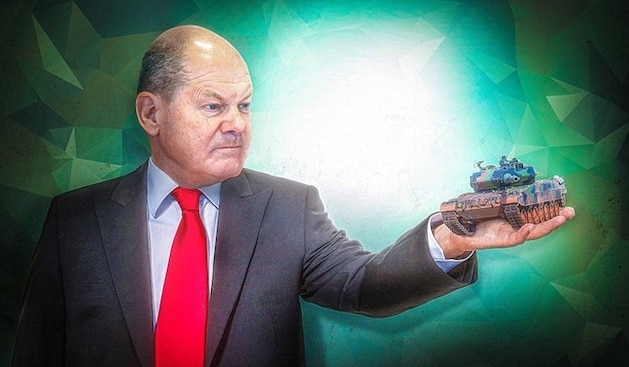There used to be cheerful professional advice with Robert Lembke, today there is Olaf Scholz. The Federal Chancellor, with his refusal to communicate, is a mystery to friend and foe alike. It seems he’s afraid – but not of Vladimir Putin, but of Rolf Mützenich.
Before the eyes of the world, the chancellor celebrates an indecisiveness that only ardent Scholz fans see as prudence. If he were to make a typical hand gesture to describe his politics, it would be to cross his arms.
The government spokesman Steffen Hebestreit sends signals from inside the spaceship, which are also known as S.O.S. of an overwhelmed chancellor.
“The government isn’t ruling out supplying Leopard tanks. She just hasn’t decided if she will.”
Marietta Slomka spoke in the heute-journal of the “scandal” in Ramstein, where Defense Minister Boris Pistorius met his US counterpart Lloyd Austin last Friday. According to another source, there were also heated arguments between the Chancellor’s Minister, Wolfgang Schmidt, and the US Minister. Scholz himself later put the drama into perspective in a background discussion with Berlin journalists.
One thing is certain: the chancellor has nothing to gain from his hesitant attitude. By not making a decision – which will presumably end with the delivery of battle tanks – he embarked on a multi-front war, which first makes him appear weak in decision-making and then later fickle.
Here are his opponents in detail:
Nobody is – again – as demanding as Volodymyr Zelenskyj. In an ARD interview, he said: “You are grown people. You can talk like that for six months, but people are dying here – every day.”
And further: “In plain language: can you deliver leopards or not? Then hand it over!”
The Ukrainian presidential adviser Mykhailo Podolyak shows no understanding for Scholz, who gives himself time to think: “Think faster.”
In the US, Republicans and Democrats are united in outrage. Republican Senator Lindsey Graham said he was tired of the “shit show” and addressed Germany: “Send tanks to Ukraine. It is in your interest that Putin loses.”
John Kirby, spokesman for the National Security Council at the White House, did the same: “If you can meet a need of Ukrainians, then of course we want to see action.”
The parliamentary manager of the Union faction, Thorsten Frei, says: “The chancellor is driving Germany into isolation.”
Even within the government there is pressure. The Chair of the Defense Committee, Marie-Agnes Strack-Zimmermann, stated: “Unfortunately, Germany just failed.”
The Greens chairman Omid Nouripour agrees: “It is therefore all the more necessary that there is finally clarity and as soon as possible. Our partner countries, above all the people in Ukraine, deserve it.”
BILD judges harshly: “Scholz’s attitude is illogical, basically anti-European – and one thing above all: COWARDS!”
The FAZ is also not squeamish: “The Chancellor’s, positively formulated, hyper-cautious line on the tank issue not only increasingly damages Germany’s reputation among its allies in East and West, but also deepens the alienation within the coalition.”
The Washington Post headlines: “Germany refuses to send tanks to Ukraine. Biden cannot accept this.”
The Financial Times editorial opened yesterday with a picture of a young woman holding the sign “Free the Leopards, Olaf Scholz!” in front of the Chancellery.
The reporting seems to make an impression on the readers: a week ago, the majority of the German population was against a delivery of Leopard main battle tanks. According to the RTL/ntv trend barometer from January 12, 55 percent were against, 38 percent were in favor.
A week later, 46 percent declared that Germany should deliver battle tanks, only 43 percent are against it, according to the ARD Deutschlandtrend. This means that Scholz no longer has any support for his position with a majority.
Polish Prime Minister Mateusz Morawiecki said on Twitter on Sunday: “We will not stand by and watch Ukraine bleed to death.”
Lithuanian Foreign Minister Gabrielius Landsbergis said at the EU foreign ministers’ meeting yesterday: “We must overcome the fear of defeating Russia.”
Conclusion: The Chancellor is clearly afraid. But not in front of Vladimir Putin, but in front of Rolf Mützenich, the head of the SPD parliamentary group. The pacifist does not threaten the Chancellor with nuclear war, but with withdrawal of loyalty. Or to put it another way: in Berlin people gamble, in the Ukraine they die.
Gabor Steingart is one of the best-known journalists in the country. He publishes the newsletter The Pioneer Briefing. The podcast of the same name is Germany’s leading daily podcast for politics and business. Since May 2020, Steingart has been working with his editorial staff on the ship “The Pioneer One”. Before founding Media Pioneer, Steingart was, among other things, Chairman of the Management Board of the Handelsblatt Media Group. You can subscribe to his free newsletter here.








